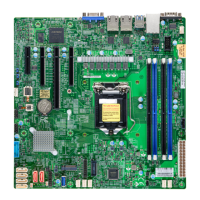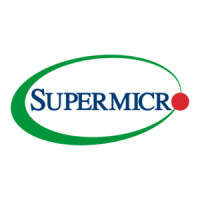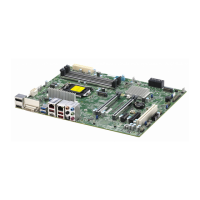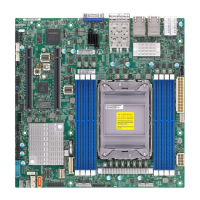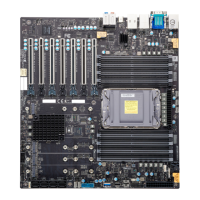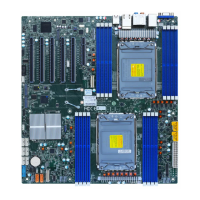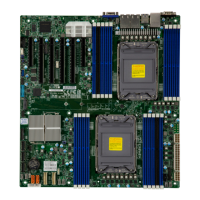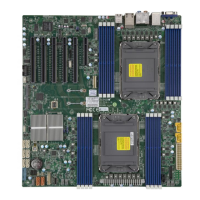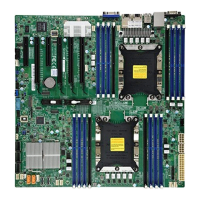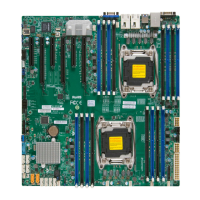Do you have a question about the Supermicro X12STL-IF and is the answer not in the manual?
Describes the manual's audience, purpose, and how it provides installation and usage information.
Provides an overview of the Supermicro X12STL-IF motherboard's features and specifications.
Explains the symbols used in the manual for warnings, important notes, and general information.
Provides the address, telephone, fax, and email for Supermicro headquarters.
Lists the contact details for Supermicro's European office.
Provides contact information for Supermicro's Asia-Pacific region.
Lists the main parts included in the retail box with their part numbers and quantities.
Details jumpers, LEDs, and connectors with their definitions and default settings.
Details the hardware specifications and capabilities of the motherboard.
Details the supported Intel Xeon E-2300 and Pentium processors and the Intel C252 chipset.
Explains how onboard voltage monitors and temperature control function for system health.
Illustrates the system's architecture, showing the CPU, chipset, memory, and I/O connections.
Provides essential precautions and measures to protect components from Electrostatic Discharge (ESD).
Guides the user through the correct procedure for installing the LGA1200 processor and its heatsink.
Provides instructions and tools needed for mounting the motherboard securely within the chassis.
Details memory compatibility, population order, and the procedure for installing DIMM modules.
Describes the locations and functions of the various ports on the motherboard's rear I/O panel.
Details the different USB ports and headers available on the motherboard and their pin definitions.
Explains the header pins for front chassis buttons and indicators like Power, Reset, and LEDs.
Details various connectors including ATX power, fan headers, and TPM/Port 80 headers.
Explains how jumpers work and provides details for specific jumpers like CMOS Clear and Watch Dog Timer.
Describes the function and status of various onboard LEDs such as Power, BMC Heartbeat, and LAN LEDs.
Provides systematic steps to diagnose and resolve common system issues like no power or no video.
Specific steps to diagnose and resolve issues where the system powers on but shows no display output.
Guides users through identifying and resolving problems that prevent the system from booting successfully.
Provides steps to diagnose and resolve issues related to memory detection or compatibility.
Troubleshooting steps for issues where the system loses its BIOS setup configuration.
Provides guidance on diagnosing and fixing system instability issues during or after OS installation.
Steps to take before contacting technical support, including gathering necessary system information.
Provides instructions for safely removing, disposing of, and installing the motherboard's CMOS battery.
Details the procedure for obtaining a Returned Merchandise Authorization (RMA) for warranty service.
Explains how to enter the BIOS setup utility by pressing the appropriate key during system boot.
Describes the layout and items displayed on the main BIOS setup screen, including date, time, and version.
Introduces the Advanced menu for configuring system performance, CPU, memory, and other hardware settings.
Covers settings related to CPU features like Flex Ratio, Prefetcher, and Virtualization Technology.
Details BIOS options for managing system performance, power consumption, and CPU states.
Provides options for controlling DDR speed, frequency, ECC support, and other memory-related parameters.
Settings for managing USB controllers, legacy support, and mass storage driver functionality.
Covers settings for network interfaces, including PXE boot, IP configuration, and link speed.
Details BIOS security features such as Administrator passwords, Secure Boot, and Lockdown Mode.
Options for setting the boot mode, boot order priorities, and managing boot devices.
Options for saving changes, discarding them, restoring defaults, and exiting the BIOS setup utility.
Lists common beep codes generated during Power-On Self-Test (POST) and their corresponding error messages.
Provides instructions for installing the Windows operating system, including driver loading.
Guides users on downloading and installing necessary drivers and utilities from the Supermicro website.
Details the SuperDoctor 5 program for monitoring system health information like temperature and voltages.
Contains warnings and instructions regarding the safe replacement, handling, and disposal of batteries.
Provides guidance on the proper disposal of the product according to national laws and regulations.
Explains the Unified Extensible Firmware Interface (UEFI) and its role in system boot management.
Provides instructions for recovering a corrupted UEFI BIOS image using a recovery block or USB device.
Detailed steps for performing UEFI BIOS recovery using a USB flash drive or CD/DVD ROM/RW.
| Brand | Supermicro |
|---|---|
| Model | X12STL-IF |
| Category | Motherboard |
| Language | English |
